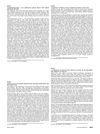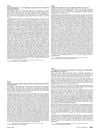 47 citations,
September 2022 in “European Heart Journal”
47 citations,
September 2022 in “European Heart Journal” Women may need different blood pressure guidelines than men for heart disease prevention.
[object Object]  23 citations,
September 2021 in “Frontiers in Cellular and Infection Microbiology”
23 citations,
September 2021 in “Frontiers in Cellular and Infection Microbiology” Testosterone's effects on COVID-19 are unclear and need more research.
2 citations,
February 2020 in “Chinese Medical Journal” Undiagnosed lupus can cause severe complications after epidural anesthesia, leading to muscle weakness and potentially death.
 1 citations,
May 2022 in “IntechOpen eBooks”
1 citations,
May 2022 in “IntechOpen eBooks” Obesity leads to physical, metabolic, reproductive issues, higher healthcare costs, and mental health problems.
 December 2024 in “Journal of the International Society of Sports Nutrition”
December 2024 in “Journal of the International Society of Sports Nutrition” Creatine monohydrate is safe and effective for muscle recovery and performance, especially for those with low creatine levels.
 January 2024 in “Journal der Deutschen Dermatologischen Gesellschaft”
January 2024 in “Journal der Deutschen Dermatologischen Gesellschaft” Non-biologic immunosuppressive drugs are crucial for treating autoimmune and chronic inflammatory skin diseases.
 October 2022 in “Frontiers in Endocrinology”
October 2022 in “Frontiers in Endocrinology” New tools show that in fish, NPY increases feeding and somatostatin decreases it.
June 2013 in “International Journal of Dermatology” Central lipohypertrophy in HIV-infected women may lead to shorter eyelashes.

The document is a detailed guide on skin conditions and treatments for dermatologists.
 12 citations,
January 2010 in “Pediatric Health”
12 citations,
January 2010 in “Pediatric Health” Early treatment and lifestyle changes are important for managing PCOS in young people to prevent long-term health issues.
 5 citations,
January 1998 in “Clinical and experimental dermatology”
5 citations,
January 1998 in “Clinical and experimental dermatology” Myotonic dystrophy should be considered in patients with hair thinning, and genetic counseling is important.
 4 citations,
April 2016 in “Journal of Dermatology Research and Therapy”
4 citations,
April 2016 in “Journal of Dermatology Research and Therapy” Anti-androgens are safe and effective for treating moderate to severe adult female acne.
 139 citations,
June 2003 in “Journal of Investigative Dermatology Symposium Proceedings”
139 citations,
June 2003 in “Journal of Investigative Dermatology Symposium Proceedings” Androgenetic alopecia in women needs more research and better management strategies.
 66 citations,
July 2007 in “Journal of Molecular Medicine”
66 citations,
July 2007 in “Journal of Molecular Medicine” Stress increases certain chemicals in the skin and nerves, which might worsen skin conditions.
 29 citations,
May 2020 in “npj Regenerative Medicine”
29 citations,
May 2020 in “npj Regenerative Medicine” Immune cells help regulate hair growth, and better understanding this can improve hair loss treatments.
 28 citations,
May 2018 in “Scientific reports”
28 citations,
May 2018 in “Scientific reports” Exercise improves insulin sensitivity and hormone regulation in PCOS rats.
 27 citations,
February 2020 in “Journal of Cardiovascular Translational Research”
27 citations,
February 2020 in “Journal of Cardiovascular Translational Research” Women generally handle heart enlargement better than men, but it's riskier for them if it occurs; hormones like estrogen offer some protection.
 18 citations,
March 2002 in “The journal of investigative dermatology/Journal of investigative dermatology”
18 citations,
March 2002 in “The journal of investigative dermatology/Journal of investigative dermatology” Estrogen increases blood vessel growth factor production, while testosterone blocks this increase.
 2 citations,
February 2009 in “Journal of the American Academy of Dermatology”
2 citations,
February 2009 in “Journal of the American Academy of Dermatology” Injecting triamcinolone into the eyebrow area may help eyelash regrowth in alopecia areata patients.
 December 2017 in “Revista Brasileira de Saúde Materno Infantil”
December 2017 in “Revista Brasileira de Saúde Materno Infantil” Pregnant women with Systemic Lupus Erythematosus have a higher risk of blood clotting problems.
 February 2009 in “Journal of the American Academy of Dermatology”
February 2009 in “Journal of the American Academy of Dermatology” Transverse sections are better for non-scarring hair loss, vertical sections are better for lichen planopilaris, and either method works for other scarring hair loss types.
 April 2006 in “Current Opinion in Endocrinology & Diabetes”
April 2006 in “Current Opinion in Endocrinology & Diabetes” Testosterone therapy can help improve sexual function, mood, and bone density in women with low androgen levels, but more research is needed on long-term safety.
 688 citations,
June 2007 in “Cell Stem Cell”
688 citations,
June 2007 in “Cell Stem Cell” Removing the ATR gene in adult mice causes rapid aging and stem cell loss.
 375 citations,
July 2006 in “Journal of Investigative Dermatology”
375 citations,
July 2006 in “Journal of Investigative Dermatology” Stress can worsen skin and hair conditions by affecting the skin's immune response and hormone levels.
 370 citations,
September 1999 in “The New England Journal of Medicine”
370 citations,
September 1999 in “The New England Journal of Medicine” Finasteride and minoxidil are effective for hair loss, but continued research is needed for better treatments.
 89 citations,
November 2014 in “Medical Clinics of North America”
89 citations,
November 2014 in “Medical Clinics of North America” Eating 500 fewer calories a day and making lifestyle changes can improve PCOS symptoms and reduce diabetes risk; more research is needed on its causes and treatments.
 76 citations,
January 2007 in “American Journal of Clinical Dermatology”
76 citations,
January 2007 in “American Journal of Clinical Dermatology” Women with PCOS often have skin problems like excessive hair, acne, hair loss, and dark patches, which can be treated with hormonal and non-hormonal therapies.
 75 citations,
October 1999 in “European journal of endocrinology”
75 citations,
October 1999 in “European journal of endocrinology” Finasteride is a safe, effective treatment for hirsutism with fewer side effects.
 46 citations,
July 1988 in “Journal of The American Academy of Dermatology”
46 citations,
July 1988 in “Journal of The American Academy of Dermatology” Hormone imbalances can cause specific skin changes, which may help in early detection of endocrine disorders.
[object Object]  45 citations,
February 2005 in “Steroids”
45 citations,
February 2005 in “Steroids” Four new compounds were more effective than finasteride in treating prostate issues and hair loss, with one being 100 times more active and safe for use.




























